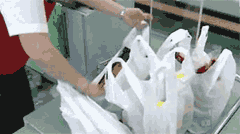Probably only global warming serves as more of a touch point in terms of environmental concerns than does the issue of plastic shopping bags.
Environmentalists have been pushing to ban the plastics for years, with success in a few cities to date, primarily in California, while others (sometimes including plastic bag industry interests) that plastic bags are actually more environmentally friendly than the paper bag alternatives.
This week, West Hollywood became the latest California city to ban retailers from using plastic bags, joining Los Angeles, San Francisco, Santa Monica, Long Beach, Pasadena, Millbrae and others in the move, some 50 cities in total. Legislation in San Diego and Sonoma County in California is also moving forward, though passage is not certain. There is also a proposal to ban plastic in retail statewide, but that legislation has failed in the state senate previously and may again this time.
But California cities are far from the only local jurisdictions to ban or consider banning retail plastic bags. Austin and Seattle have already banned plastics, while Washington DC charges a small plastic bag tax.
New Jersey appears likely to take up legislation this fall that would either ban plastic bags in the state or charge a fee to consumers if they want plastic at retail check out.
In Rhode Island, the city of Barrington appears ready to pass such a ban, while Bainbridge Island's ban will begin soon.
Dallas is also now starting to discuss legislation, joining Eugene, OR and many others to test the waters.
Not surprisingly, groups representing companies that make plastic grocery bags, such as the the Carrier Bag Consortium (CBC) in the UK, think such legislative efforts in the US and Europe are misplaced.
The CBC recently wrote that "The rigorous Environment Agency Life Cycle Analysis clearly demonstrates that alternatives to the lightweight plastic bag require far more of the earth’s precious resources to produce and have far higher impacts across a life cycle." It also says that plastic bags now use much higher levels of recycled plastics than just a few years ago and that the carbon emissions needed to produce them have also decreased substantially.
This debate is likely for many years. Retailers, of course, prefer plastic bags because they are cheaper than paper bags.
A new report on the impact of city bans on plastic bags from the National Center for Policy Analysis (NCPA) says the bans results in shoppers going to areas that do not have such a ban -- affecting revenues and employment.
 The NCPA is a think tank that supports free market policies, and as such would generally be against legislation banning specific products. The NCPA is a think tank that supports free market policies, and as such would generally be against legislation banning specific products.
That aside, the new study looked just at Los Angeles County, which implemented a ban on plastic bags in July 2011. However, that ban only applied to unincorporated areas of the county, and did not apply to city jurisdictions within the county.
The analysis over the past year since the ban found that incorporated stores experienced an average increase in sales of 3.4%, while unincorporated stores reported a decline in sales of –3.3%. (The full study can be found here: A Survey on the Economic Effects of
Los Angeles County’s Plastic Bag Ban.)
Of course, association does not equal causation, and other factors could have been at work other than the plastic bag ban.
Still, the report says that "Though a variety of factors influence sales, the survey results are consistent with a shift in consumer purchases from stores in unincorporated areas affected by the ban to stores in incorporated areas that were not affected by the ban."
Correspondingly, retail employment was down in affected areas, while up in unaffected areas.
Interestingly, the study also found that bans on plastic bags at check out increased consumer use of plastic bags in the produce area, which they use like regular plastic bags. We wouldn't have thought of that one.
The report also makes a strong case that plastic bags in total are more environmentally friendly than the paper alternative.
The report concludes that relative to plastic bag bans, "The economic costs are substantial. Banning plastic bags reduces employment; provides an unfair advantage to retailers in one geographic area over another; leads to the theft of store shopping carts and shopping baskets; results in customers using more plastic produce bags (thus undercutting the effect of the ban); increases prices for consumers; decreases profit for producers; and decreases economic activity in the area. An impartial cost-benefit analysis would be unlikely to justify banning plastic bags."
In our view, the NCPA data here is far from conclusive, but the plastic bag controversy is really now almost meaningless in the grand scheme of things, and has really become much more about symbolism than real environmentalism.
Plastic bag bans - good environmentalism, or mere symbolism? Let us know your thoughts at the Feedback button below.

|